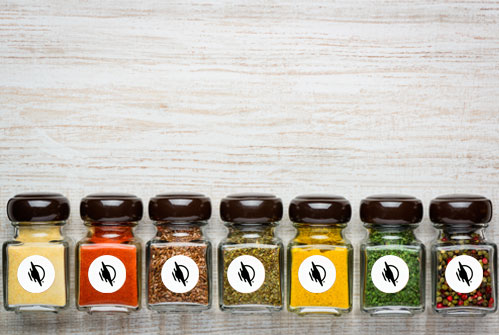I’m Colleen Connor, and I have Cone Rod Dystrophy. At about age 14 I began to lose my vision, and it has continued to get worse since then. Like many people with visual impairments, I use many different tools to make my home more accessible. One area that is particularly challenging is identifying objects that feel alike. I’ve used apps with OCR software to read labels. Sometimes I take pictures of items and send those to a friend. I’m also an avid Braille labeler, which I use on my clothes and a lot of kitchen products.
When I first heard about WayAround, an information system with tags that can be read aloud when your phone gets near them, I realized I could finally label all the spices in my kitchen!
Let me explain why this is so exciting, starting with a tour of my spice cabinet.
I have a cabinet dedicated to spices with a riser-like insert topped with jars of various sizes. Think of it like a little choir of cooking flavors. The only problem is the jars don’t currently sing to me what they are when I pick them up. The glass jars with screw tops are all identical, so I don’t always know what they are.
I have roommates, and we’ve come up with some systems that help. We reuse the same jars and canisters and simply refill them when a spice runs out. This way, I always know what is in each jar. We also put things back in the same place to ensure we can find them each time.
I love using braille labels, however braille can take up a lot of room because of how it is read and created. There’s not enough room to say what I would like on every item. On a small jar of Cardamom for instance—I can’t fit a braille label that says “Cardamom” on the glass of the jar without covering up some of the label for my sighted roommates.
By attaching a WayTag to the different spices, I can have the tag say to me “Cinnamon”, and also “one tablespoon of this per 1 cup of oats.” Associating the spices with recipes they go with, or simply labeling them would save me from the sniff test or taste game.
Plus, WayTags are about the size of a quarter, so they will fit on the top or sides of the containers without interfering with the label.
While I am waiting for this amazing technology, I have started brainstorming some ideas for using WayTags. Today, I’ll share some other ideas for the kitchen. Be sure to follow the WayAround blog for inspiration and tips for other spaces in your home and office.
The This-or-That Dilemma
Many food containers feel exactly the same but can have very different ingredients. Think about these examples:
- Ketchup vs. mustard.
- Minced garlic vs. jelly.
- Orange juice vs. milk.
Adding in the description and details for canned goods, similar shaped boxes, containers, and jars would give people the freedom to navigate the kitchen on their own terms.
Not only can you label what the product is, but you can add additional details, too. For example, you could include the expiration date, ingredients, or allergens.
I got really pumped when I heard about the additional comments you can add because I have a lot of allergies, and I would be able to know which protein bars have almond butter. When you are allergic to all tree nuts and pitted fruits, reading labels becomes a thing you just have to enlist help for. If I could know this information without having to ask? The independence may seem small, but gaining any independence back as someone with sight loss is huge.
There are different types of WayTag products—magnets, stickers, and clips would all work for the kitchen. Magnets work great for metal cans (though aluminum isn’t magnetic). It works best to put them on the top flat surface, since they can easily get knocked off of the curved side.
Yes, there are WayTags that can go in the fridge.
Yes, some WayTags can withstand the dishwasher.
The WayTag buttons are waterproof and extreme temperature rated, so they can go in the freezer, fridge, or dishwasher. I recommend using the oval hole type with a rubberband or zip tie.
This is just scratching the surface of ideas for using WayAround in the kitchen. Be sure to sign up for our newsletter for other ideas about how to use WayAround. I’ll be writing more as WayTags become available, and let us know your creative ideas for how to use WayTags!

